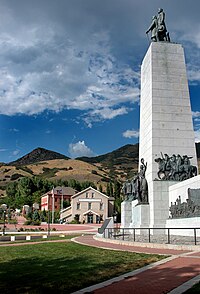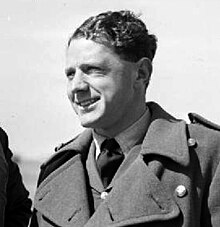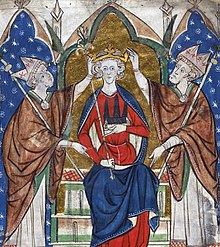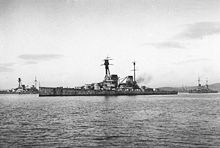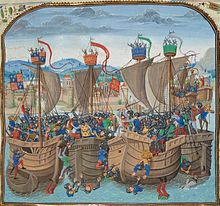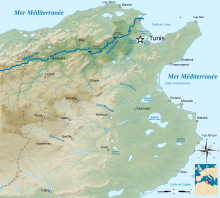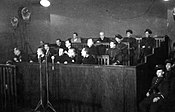Portal:History
The History Portal
History is the systematic study of the past. As an academic discipline, it analyzes and interprets evidence to construct narratives about what happened and explain why it happened, focusing primarily on the human past. Some theorists categorize history as a social science, while others see it as part of the humanities or consider it a hybrid discipline. Similar debates surround the purpose of history, for example, whether its main aim is theoretical, to uncover the truth, or practical, to learn lessons from the past. In a slightly different sense, the term history refers not to an academic field but to the past itself or to individual texts about the past.
History is a broad discipline encompassing many branches. Some focus on specific time periods, such as ancient history, while others concentrate on particular geographic regions, such as the history of Africa. Thematic categorizations include political history, social history, and economic history. Branches associated with specific research methods include quantitative history, comparative history, and oral history.
Historical research relies on primary and secondary sources to reconstruct past events and validate interpretations. Source criticism is used to evaluate these sources, assessing their authenticity, content, and reliability. Historians integrate the perspectives of several individual sources to develop a coherent narrative. Different schools of thought, such as positivism, the Annales school, Marxism, and postmodernism, have distinct methodological approaches.
History emerged as a field of inquiry in the ancient period to replace myth-infused narratives, with influential early traditions originating in Greece, China, and later also in the Islamic world. Historical writing evolved throughout the ages and became increasingly professional, particularly during the 19th century, when a rigorous methodology and various academic institutions were established. History is related to many fields, including historiography, philosophy, education, and politics. (Full article...)
Featured picture
Did you know (auto generated)

- ... that a poem by Moses da Rieti includes an encyclopedia of the sciences, a Jewish paradise fantasy, and a post-biblical history of Jewish literature?
- ... that Professor of History Lorenzo Kamel deems Umma–Lagash the first recorded war in human history?
- ... that the radio program Radio City Music Hall of the Air employed approximately 10,000 musicians during the first eight years of its broadcast history?
- ... that Alfredo Frohlich formed an award-winning collection of Panamanian postal history that included items from as early as 1777?
- ... that 25 years after her career ended, Jennifer Martz remains second in NCAA Division III history in hitting percentage?
- ... that Maggio di Accettura, a festival in Italy dedicated to the Christian martyr Saint Julian, might have pagan origins or be linked to Langobard history?
Joel Brand (Hungarian: Brand Jenő; 25 April 1906 – 13 July 1964) was a member of the Budapest Aid and Rescue Committee (Va'adat ha-Ezra ve-ha-Hatzala be-Budapest or Va'ada), an underground Zionist group in Budapest, Hungary, that smuggled Jews out of German-occupied Europe to the relative safety of Hungary, during the Holocaust. When Germany invaded Hungary in March 1944, Brand became known for his efforts to save the Jewish community from deportation to the Auschwitz concentration camp in occupied Poland and the gas chambers there.
In April 1944 Brand was approached by SS-Obersturmbannführer Adolf Eichmann, head of the German Reich Security Head Office department IV B4 (Jewish affairs), who had arrived in Budapest to organize the deportations. Eichmann proposed that Brand broker a deal between the SS and the United States or Britain, in which the Nazis would exchange one million Jews for 10,000 trucks for the Eastern front and large quantities of tea and other goods. It was the most ambitious of a series of proposals between the SS and Jewish leaders. Eichmann called it "Blut gegen Waren" ("blood for goods"). (Full article...)
On this day
- 1811 – Peninsular War: Outnumbered French forces under Édouard Mortier routed and nearly destroyed Spanish troops at the Battle of the Gebora near Badajoz, Spain.
- 1903 – A blockade against Venezuela (depicted), caused by President Cipriano Castro's refusal to pay foreign debts, was lifted.
- 1942 – World War II: U.S. president Franklin D. Roosevelt signed Executive Order 9066, authorizing the forcible relocation of over 112,000 Japanese Americans to internment camps.
- 1948 – The Southeast Asian Youth Conference, which is believed to have inspired armed communist rebellions in different Asian countries, opened in Calcutta, India.
- Nicolaus Copernicus (b. 1473)
- Choekyi Gyaltsen, 10th Panchen Lama (b. 1938)
- Jennifer Doudna (b. 1964)
- Harper Lee (d. 2016)
Selected quote
What we find in books is like the fire in our hearths. We fetch it from our neighbors, we kindle it at home, we communicate it to others, and it becomes the property of all.
— Voltaire, 18th century French philosopher
Related portals
More Did you know...
- ... that the anti-religious campaign culminating in the Stalinist show trial of the Kraków Curia (pictured) led to the imprisonment of 123 Polish Roman Catholic priests in just one year?
- ... that Confederate brigadier general Alfred E. Jackson was pardoned by President Andrew Johnson because of his kindness toward Johnson's family during the Civil War?
- ... that after HMS Porcupine was nearly split in two by a torpedo, the halves were nicknamed HMS Pork and HMS Pine?
- ... that the Experiment was a boat powered by horses running on a treadmill and propelled by a then-novel type of screw propeller?
- ... that one of the highest-ranking generals in China was injured in battle nine times?
- ... that in Mesopotamian mythology, the Apkallu were sent by the god Enki, from Dilmun to teach human beings various aspects of civilization?
- ... that Karl Marx's theory of historical trajectory attempted to prove the long-term unsustainability of capitalism?
- ... that in November 1921, the schooner Cymric collided with a tram in Dublin?
Topics
Categories

History • By period • By region • By topic • By ethnic group • Historiography • Archaeology • Books • Maps • Images • Magazines • Organizations • Fictional • Museums • Pseudohistory • Stubs • Timelines • Chronology • People • Wikipedia historians
WikiProjects
![]() WikiProject History •
Ancient Near East • Australian History • Classical Greece and Rome • Dacia • Former countries • History of Canada • Chinese history • European history • Heraldry and vexillology • Indian history • Jewish history • Medieval Scotland • Mesoamerica • Military history • Middle Ages • History of Science
WikiProject History •
Ancient Near East • Australian History • Classical Greece and Rome • Dacia • Former countries • History of Canada • Chinese history • European history • Heraldry and vexillology • Indian history • Jewish history • Medieval Scotland • Mesoamerica • Military history • Middle Ages • History of Science
WikiProject Time • Days of the Year • Years
WikiProject Biography • Composers • Political figures • Saints • United States Presidents
Things you can do
 |
Here are some tasks awaiting attention:
|
Associated Wikimedia
The following Wikimedia Foundation sister projects provide more on this subject:
-
Commons
Free media repository -
Wikibooks
Free textbooks and manuals -
Wikidata
Free knowledge base -
Wikinews
Free-content news -
Wikiquote
Collection of quotations -
Wikisource
Free-content library -
Wikiversity
Free learning tools -
Wiktionary
Dictionary and thesaurus

